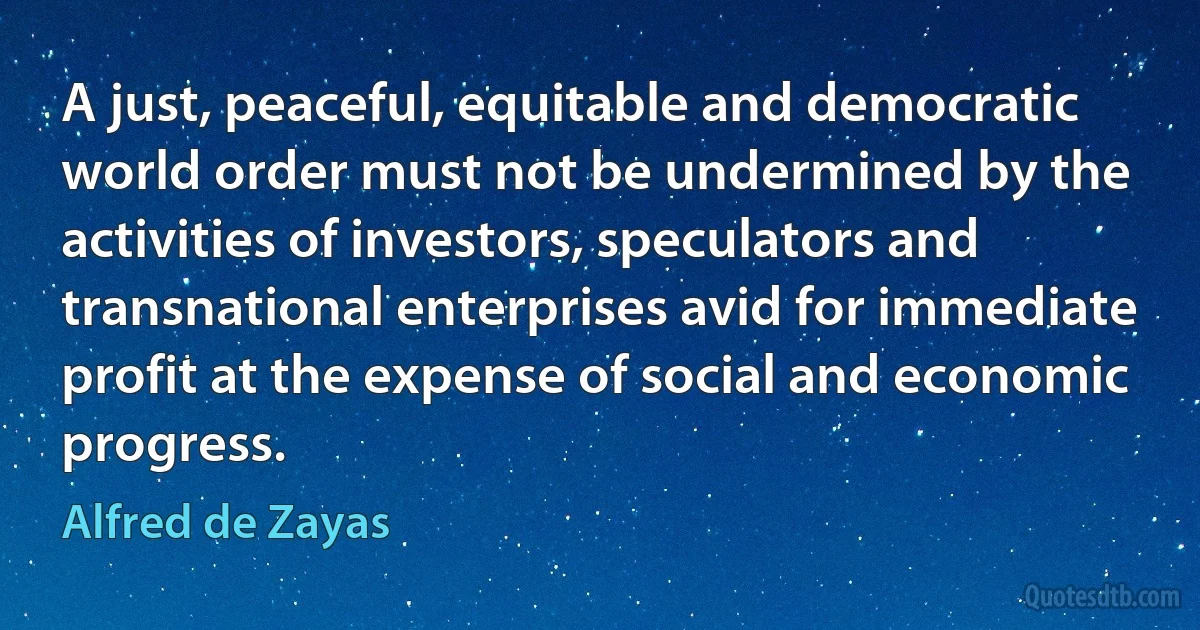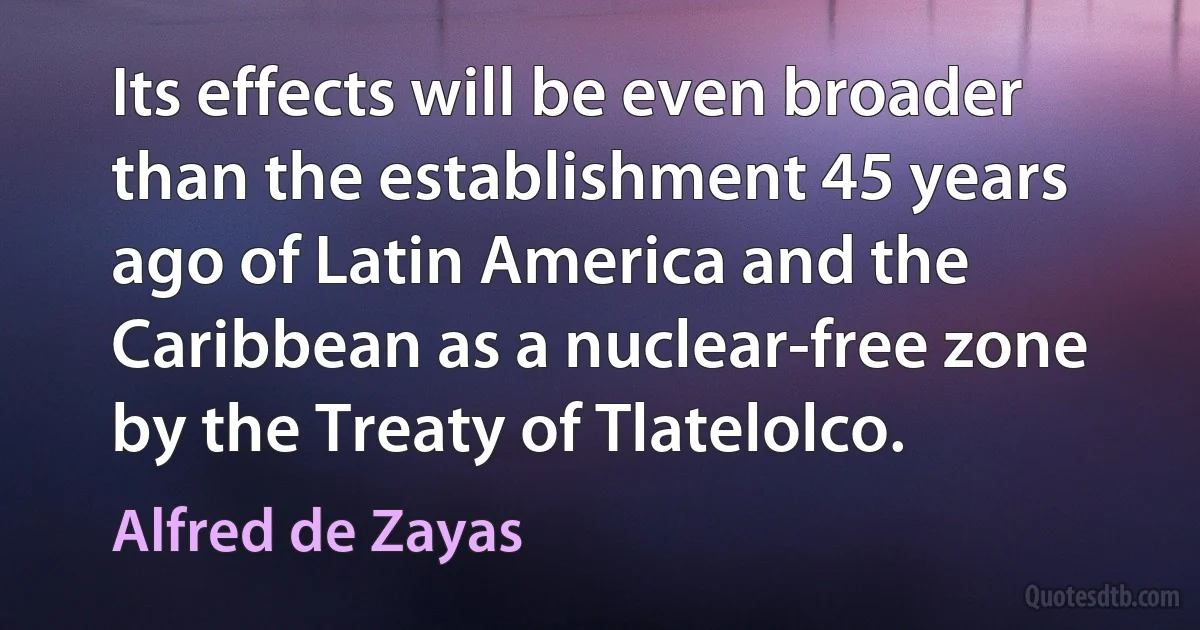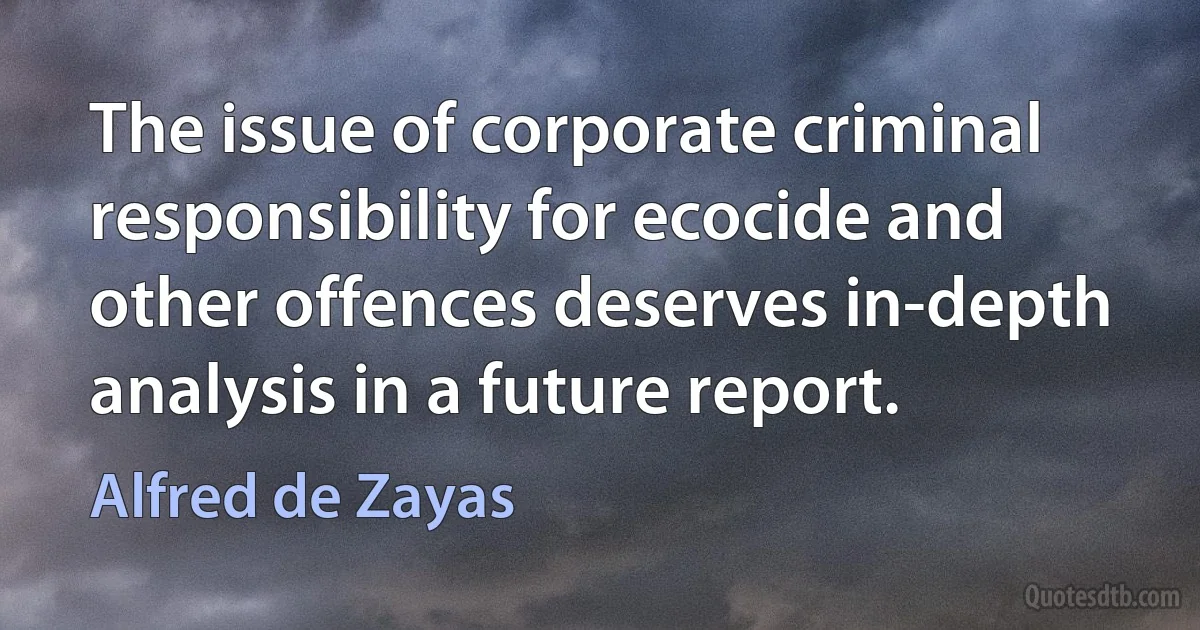Alfred de Zayas quotes - page 6
A neutral observer would have no difficulty in identifying instances of disconnect between government and people, most obviously in authoritarian and totalitarian regimes where civil society's voices are muzzled and where peaceful protests are prohibited or severely suppressed,24 but also to a lesser degree in democracies, particularly "representative democracies” that do not genuinely represent, business-driven democracies and so-called "lobby-democracies”, where elected officials tend to be more responsive to the lobbies than to the population.

Alfred de Zayas
I am especially worried about the impact that investor-state-arbitrations (ISDS) have already had and foreseeably will have on human rights, in particular the provision which allows investors to challenge domestic legislation and administrative decisions if these can potentially reduce their profits.

Alfred de Zayas
Let us abandon the obsolete division of rights into artificial categories of first, second and third generation rights – with their intrinsic prejudices. Let us consider redefining human rights in functional terms. I am suggesting a functional paradigm of enabling rights (such as the rights to peace, food, health and homeland), inherent rights (such as equality and non-discrimination), procedural rights (such as access to information, freedom of expression and due process) and what I would call outcome rights, that is, the practical realization of human dignity in the form of the right to our identity, to achieve our potential and to be just who we are, free to enjoy our own culture and opinions. The absence of this outcome right to dignity and self-respect is reflected in much of the strife we see in the world today.

Alfred de Zayas
Moving the human rights agenda forward requires the promotion of a social and economic environment conducive to respect for human dignity. It is patent that individuals subjected to violence, coercion and war cannot fully exercise their rights. It is thus important to reaffirm the credo of the Charter of the United Nations that peace is a condition for the enjoyment of all human rights. The human right to peace also has important economic, social and cultural components. Following the entry into force of the Optional Protocol to the International Covenant on Economic, Social and Cultural Rights on 5 May 2013, individuals can invoke violations before the Committee on Economic, Social and Cultural Rights. Thus, the right to, inter alia, health, a safe environment, food, water and education has acquired even more resonance in the life of each individual.

Alfred de Zayas
Codification and mechanisms do not sufficiently ensure the right to peace. What is crucial is to develop a true culture of peace. This requires education for peace. Everyone – not only children – should be educated in compromise, cooperation, empathy, solidarity, compassion, restoration and reconciliation. In short, we must learn respect for others and how to live in harmony, even if we agree to disagree. Negotiation and mediation skills must be taught so as to prevent breaches of the peace and other forms of violence. A philosophical paradigm change is necessary, so that we are not caught in the old mind-set, in the prevailing culture of violence, the logic of war, aggressive attitudes, practices of economic exploitation and cultural imperialism.

Alfred de Zayas
A democratic and equitable international order can only flourish in a peaceful environment. With conflict prevention being the overarching raison d'être of the United Nations, the hundreds of wars since 1945 indicate that the Organization must reform in order to live up to its purposes and principles.

Alfred de Zayas
Developing a culture of peace requires education for peace. Everyone - not only children - should be educated in compromise, cooperation, empathy, solidarity, compassion, restoration, mediation and reconciliation.6 Negotiation skills must be taught so as to prevent breaches of the peace and other forms of violence as well as to ensure a peaceful continuation of life after conflict. A philosophical paradigm change is necessary to break out of the prevailing culture of violence, the logic of power, practices of economic exploitation, cultural imperialism and impunity. A road map to this culture of peace entails a strategy to identify and remove obstacles, among which are the arms race, unilateralism and the tendency to apply international law à la carte.

Alfred de Zayas



